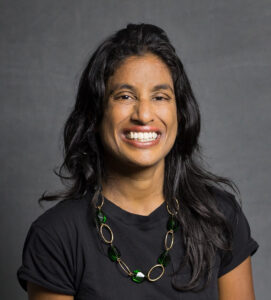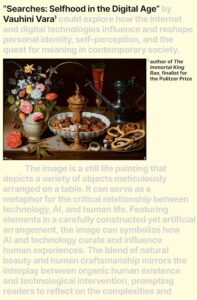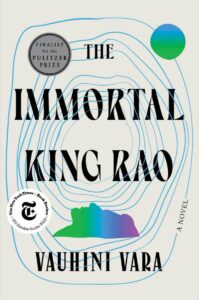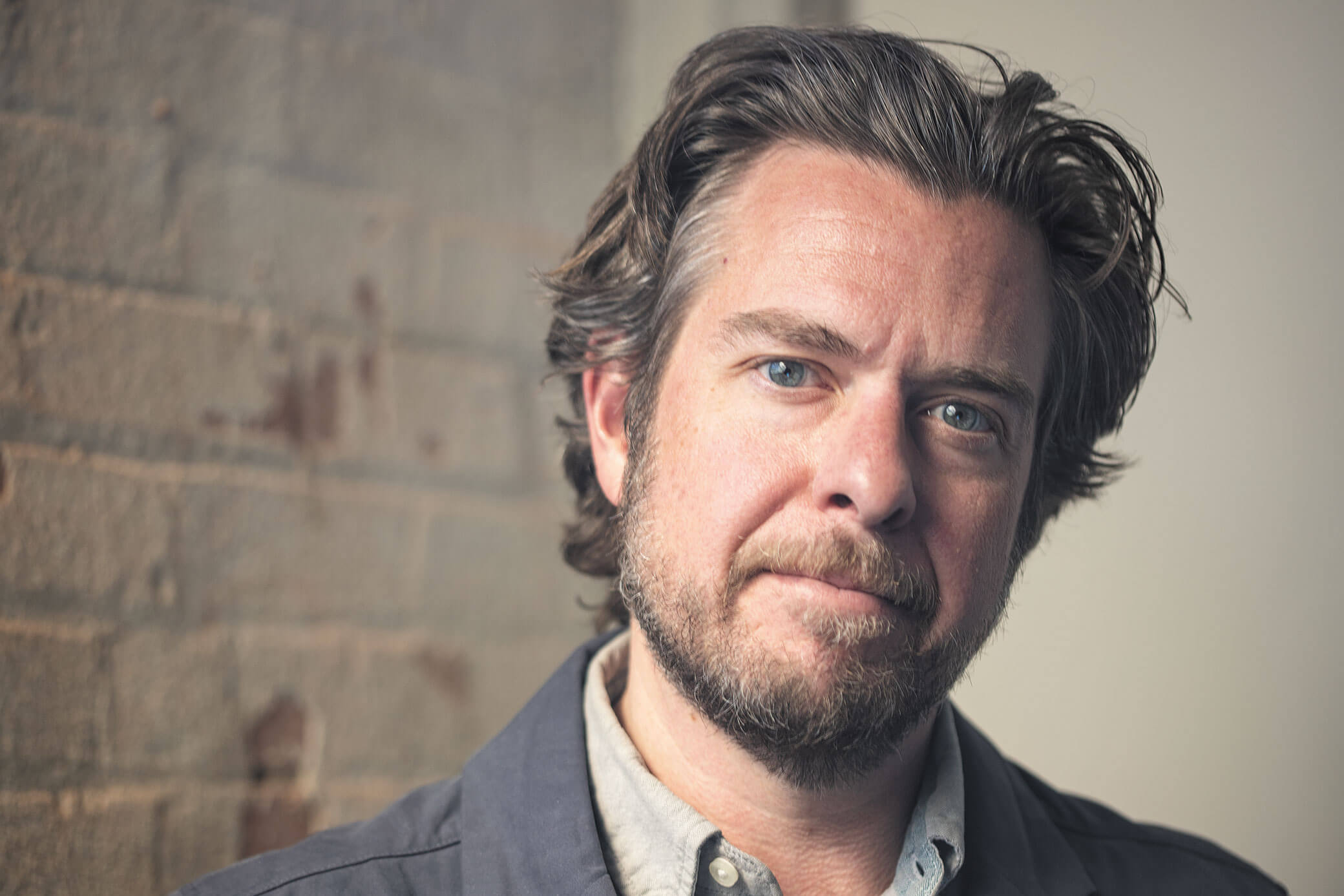Author on a Google search for meaning
An interview with Vauhini Vara about her new book Searches: Selfhood in the Digital Age
An interview with Vauhini Vara about her new book Searches: Selfhood in the Digital Age
Part essay, part history, part memoir and part critique of capitalism, Fort Collins writer Vauhini Vara’s new book traces her coming of age at the dawn of digital domination. Searches: Selfhood in the Digital Age is the book Vara was born to write.
It’s journalistic—Vara has worked as a technology and business reporter for the Wall Street Journal, the New Yorker, The New York Times Magazine and Businessweek, covering Big Tech titans like Oracle and Facebook.

Vauhini Vara Credit: Brigid McAuliffe
It’s experimental and emotional—Vara’s debut novel The Immortal King Rao was a finalist for the Pulitzer Prize and tells the story of a man born in a rural village in India who becomes a nearly omnipotent corporate CEO.
It’s a probing, essayistic account of the rise of the internet—Vara came of age at the advent of AOL chatrooms and in the Pacific Northwest, not far from Microsoft headquarters.
Searches braids together all these strengths into an ultimately optimistic book that challenges us to reject our feelings of helplessness and anxiety in the face of rapidly advancing technologies like AI and begin to exert our agency once again.
As Vara explains, the book isn’t so much a screed against technology as it is a critique of corporations that twist technology to exploit and ensnare people in exchange for power and profit. The following interview has been edited and condensed.
BEN TROLLINGER: This book is about an enduring relationship that you’ve had throughout your life. And I’m wondering how you would describe it. Is this an abusive relationship, an ambivalent one or a kind of love story?
VAUHINI VARA: I think what I was interested in getting across through my own relationship with technology is my complicity and, by extension, our complicity, in the rise of Big Tech and the amassing of wealth and power on the part of big technology companies. So, I would say it’s a codependent and complicit relationship.
BT: You structure this book in an experimental way. How do you intend the reader to receive these interstitial chapters, which are often written by AI, or are collage-like arrangements of your internet searches
VV: I was interested both in what our use of these technologies tells us about ourselves, and what they tell us about the technologies themselves. In the parts of the book in which the text itself is sort of an engagement with the technology—whether it’s the chapter made up of my Google searches or this ongoing dialogue with ChatGPT—the goal is to enact that on the page. With the dialogue with ChatGPT, I personally read it as a kind of power struggle between myself and this corporate technology.
BT: A lot of the conversation around ChatGPT and the like is the casual consumer-facing parts of it, like kids cheating on college assignments or whatever. When I talk to friends who are in software development or IT, they don’t talk about that. They talk about the impact it’s going to have on labor.
VV: In some ways I think those are the same conversation. We are asking a question about human autonomy and agency. When teachers or parents express concerns that kids are cheating using AI, I think the real concern, the underlying concern, is that students are therefore not learning to think. They’re not learning how to express their agency and autonomy. I think the same is true when critics worry that AI is going to displace human workers. All of this feels to me like part and parcel of the same conversation, which is a conversation about a worry, not about machines displacing humans, but a worry about big corporations exerting influence over individuals and communities.
BT: Staying in that vein, Shoshana Zuboff’s work, The Age of Surveillance Capitalism, looms large in the book. Can you describe her influence on how you think about life in the digital age?
VV: That book was published before large language models, like the ones underlying ChatGPT, were pervasive. But she does a thoughtful job of contextualizing big technology companies and what they do within this broader history of not just capitalism, but economic systems that, in general, consolidate power and wealth. The case she makes is that technology companies are creating a knowledge and information gap between themselves and us. They know more about us collectively than any of us could possibly know. And then they can use that knowledge and information to further consolidate their wealth and their power. [Zubov] writes a lot about the ways in which technology companies are doing all this by giving us no other choice but to use their products. There’s a kind of coercion that she’s interested in. While I accept a large part of that argument, I find it [important] to acknowledge our own agency in using these products, which to me is the subject of [my] book, right? We are using these products in part because we are making a choice to use these products. That then opens up the possibility that there are other options to consider. If this is not a world in which we want to live, what are the other possible worlds we could design?
BT: In the book, you write, “Maybe art and extraction, communication and domination, were always interdependent.” That’s a theme that runs throughout the book—you’re always questioning the ethics of consumption [and making things]. Break that down for me.
VV: I’m always interested in kind of complicating the binary narrative in which it’s like—we’re the good guys, and they’re the bad guys. We don’t really have to do any self-reflection here because they’re the ones doing all the bad stuff. I use Google Docs to write my novels. I’m talking to you on Zoom on a MacBook Air. I have my iPhone right here. I do use Amazon Prime. I do use ChatGPT. I use those things for my work, for my art. I think acknowledging that reinforces this complicity that I’m interested in. I think it opens up the possibility that we all can collectively take responsibility together.
BT: You reference a Jorge Luis Borges short story in your book that has this striking central image of a map that becomes this one-to-one equivalent of the territory it’s supposed to be representing. You also cite [the French philosopher Jean] Baudrillard in this context and he takes it a step further, where the map overtakes the terrain altogether. In what ways do you see that now?

Releases on April 8. Purchase from Bookshop.org or your favorite independent bookseller.
VV: I was interested in the ways in which it seems big technology companies are invested in the map taking over the terrain. If the terrain itself was historically the locus of power, one amassed power by literally taking over more land. We now don’t think about power in those terms. We think about power in terms of capital. We have these global companies—Meta, OpenAI and Apple—for whom annexing a country is not an option and yet they have more power and wealth than many individual nations.
BT: The writer Ted Gioia recently traced this trend in arts and culture. He explains that in the late 20th century, art was swallowed up by the bigger fish of entertainment. In the 21st century, the shark of distraction gulps up entertainment. And now it’s like the blue whale of addiction threatens to devour everything. Addiction seems to be a feature of the digital age.
VV: On the one hand, these technology companies should be held responsible for their role in addicting us. And on the other hand, we bear some responsibility too. So that’s what I wrestle with. How are those two responsibilities intertwined?
BT: What advice do you give to parents who are raising kids coming of age without any real reference to what Neil Postman called “the age of literacy”?

Purchase from Bookshop.org or your favorite independent bookseller.
VV: I don’t know that I’m in a position to give it. Certainly, somebody’s going to come back to me in five years when my kid is 14, waving my own words at me while I’m hypocritically letting him use TikTok on his phone or whatever. I would say that reading books[sic]. Books are a very all-purpose technology to nurture cognition and creative original thoughts.
BT: I don’t know if you’ve heard the term “flat ontology.” It’s the idea that digital spaces have a way of making everything the same. You can find translations of The Odyssey on the internet, but that’s given no more importance or weight than a video of a toddler getting upset that somebody took their corn on the cob away.

Buy from Bookshop.org or your favorite independent bookseller.
VV: Where I think that framing breaks down is that actually the toddler who’s upset that his corn got taken away is in fact prioritized because these algorithms are prioritizing things that attract a certain kind of engagement that’s different from the engagement we’re talking about when we’re talking about The Odyssey. That’s another way in which I find it complicated to unbraid the role of these companies versus our own agency. I want to be able to say, listen, let’s all decide what we care more about; maybe it’s not The Odyssey, maybe it’s something else, right? But we care more about that than about than the viral funny video, which isn’t to say viral funny videos can be their own art form. I wonder how strong our convictions need to be in order to break through the massive amounts of investment that these companies are putting into convincing us otherwise.
BT: I’m trying to remember the exact words of the David Graeber quote everyone uses, which is something like, the world is something that we make and we could just as easily make it differently. Do you have a vision for what that should look like [for the internet]?
VV: I think what I’m trying to do toward the end of the book is open up an imaginative space that allows readers—and all of us—to come up with our own ideas about what that might look like. I think alternate forms of ownership are interesting to think about, right? What are ways in which we could build technologies that provide us with the things that we actually find useful and interesting and entertaining without exploiting us? And maybe that means communally owned technologies. Maybe it means technologies owned by nonprofit foundations. Maybe it means worker-owned technologies. I think some of these things can sound kind of like pie in the sky, but then we have to remind ourselves that, like, Norton, the publisher of my first two books, is one of the biggest publishers in this country, but it is independent and employee-owned. Wikipedia as one of the most visited websites, and that is run by a foundation. And so, these models do exist, which suggests that we could be employing them in even more ways, even more creative ways. I would agree with David Graeber—this world isn’t the only possible world available to us and the future is unwritten. It’s up to us to decide what that looks like.
Click here for more from Ben Trollinger.
